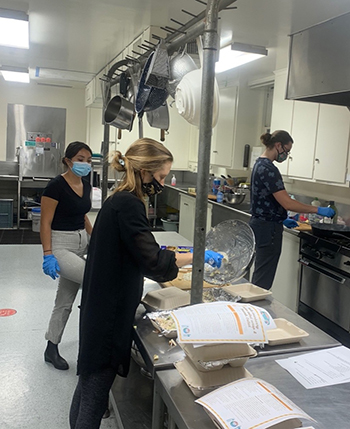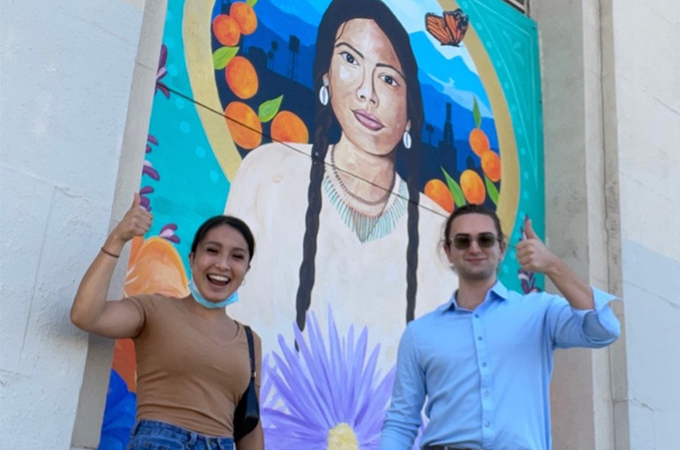With senior year approaching quickly and conversation surrounding the senior Capstone project becoming more urgent, then-juniors Diana Flores ’22 and Jackson Keene ’22 both saw the internship at nonprofit organization Project Horseshoe Farm as a great solution to satisfying the University of Redlands’ Health, Medicine and Society graduation requirement. Unbeknownst to them, this organization fostered a dynamic health-oriented environment that would challenge their understanding of how healthcare and its management affects the lives of diverse community members.
“It was nothing at all what I had expected, and that was important for me in many ways,” said Keene, a Health, Medicine and Society major and Race and Ethnic Studies minor. “It really put me into a space with people who wanted to serve the community, and I learned there are many ways to do that.”
Founded by Dr. John Dorsey in 2007, Project Horseshoe Farm has as its primary goal to support vulnerable members of the community through service, concentrated on helping with social facets of life that can and do affect health. Horseshoe Farm works on prioritizing the community member directly with a relationship-oriented approach when offering resources.

“We helped them with their life and told them ‘What do you need from us?’” said Flores, a Health, Medicine and Society major and Spanish minor who recently interned with Keene interned at Horseshoe Farm’s Pomona site, which launched in summer 2020.
The Bulldogs participated in Horseshoe Farm’s three main programs designed to help community members navigate areas of life unaddressed by the current healthcare system.
The Health Partners Program connects vulnerable community members with interns who can assist them with anything they need help with. Reflecting on her own experience, Flores believes she was able to guide her health partner to more realistic and helpful solutions through friendship. Alongside the organization God’s Pantry, Flores and Keene also delivered cooked meals and care packages of groceries throughout Pomona, supporting those unable to get food due to COVID vulnerability.
The Youth Program addresses the individual academic needs of students through small-group tutoring and advising. Keene recalls his collaborative work with Pomona Hope as a transformative experience, changing his perception of what health and health care encompasses, as education was not an area that previously came to mind.
The Community Center Program positions interns in leadership roles to help organize and facilitate actions designed to improve the wellbeing of seniors and adults living with mental illness. Flores and Keene collaborated to produce a booklet of various recipes, games, and activities to entertain those who faced boredom during a COVID quarantine. Partnering with Hope for Home, Flores was also able to provide clothes, supplies, food, and space for connection and compassion to the Pomona homeless community.
In a weekly discussion seminar led by Dorsey, interns reflected on assigned readings related to what it means to serve a community’s health and how that can be accomplished. Flores noted topics in her Health, Medicine, and Society Health Promotion and Education course worked seamlessly in their discussions to support the idea of presenting rather than enforcing resources to the community.
“Project Horseshoe farm helped crystallize my interest in the non-traditional ways we can affect, address, and understand healthcare,” said Keene.
Horseshoe Farm’s prioritization of the community members’ needs and their social experience in the healthcare and community service programs coincides with the philosophy of the Health, Medicine, and Society program that meaningful healthcare requires a multifaceted perspective focused on understanding health as more than medical interaction.
“[The internship] made me see a lot of the social structures I was reading about, as I wasn’t exposed to them as much living in a suburban community in Portland,” said Keene. “I was thrust into [them] during my time in Pomona.”
Learn more about the U of R’s Health, Medicine, and Society program.






